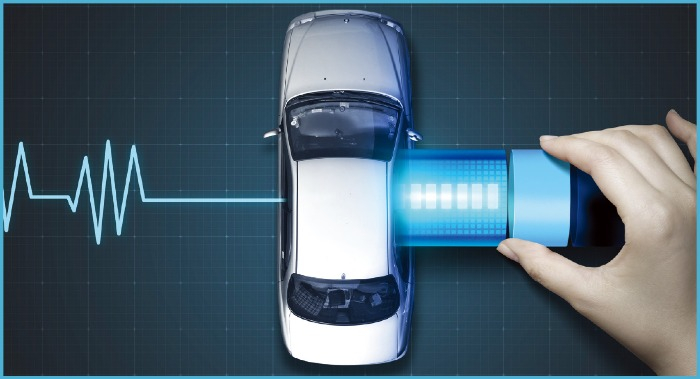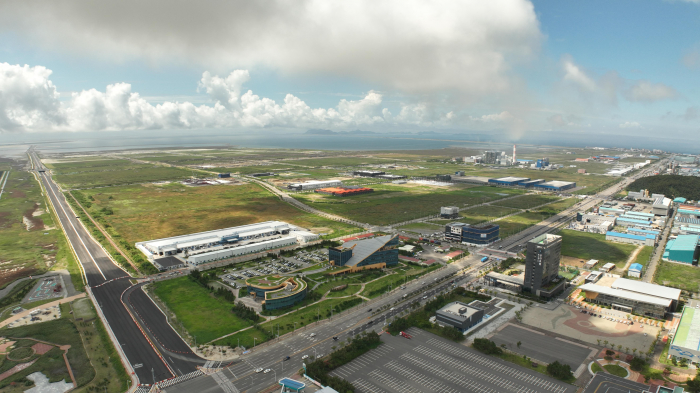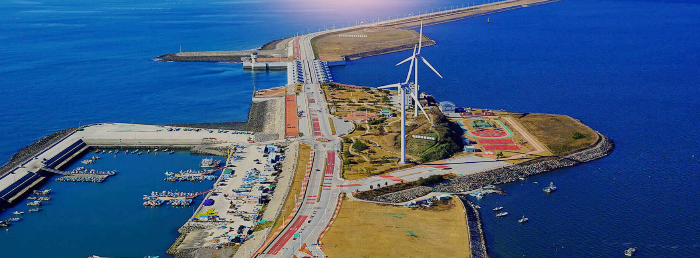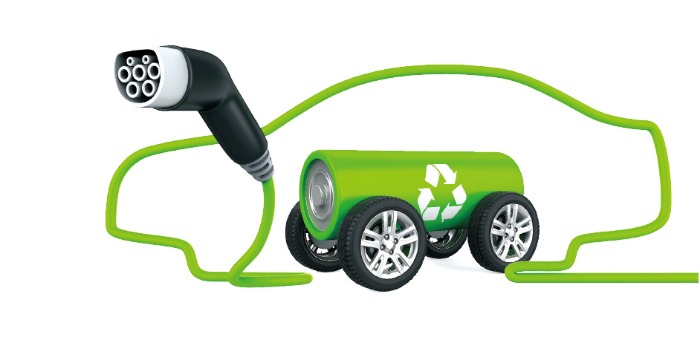Battery materials firms revive Korean cities with new plants
The Saemangeum reclaimed land off the West Sea is emerging as a battery materials industry cluster
By Jun 20, 2023 (Gmt+09:00)
LG Chem to sell water filter business to Glenwood PE for $692 million


KT&G eyes overseas M&A after rejecting activist fund's offer


Kyobo Life poised to buy Japan’s SBI Group-owned savings bank


StockX in merger talks with Naver’s online reseller Kream


Meritz backs half of ex-manager’s $210 mn hedge fund



As South Korean battery materials companies such as LG Chem Ltd., POSCO Future M Co. and EcoPro Co. aggressively step up facility investment, they are building manufacturing clusters across the country to concentrate their cathode, precursor and raw materials processing factories.
While the move is largely to meet the surge in orders from battery makers, their domestic facility expansion is also part of efforts to satisfy the requirements of the US Inflation Reduction Act.
Under the law, battery makers must source a certain percentage of materials from North America, or its trading partners, to qualify for tax credits. South Korea is one of the US' free trading partners.
This year, LG Chem, POSCO Future M, SK On Co., EcoPro, L&F Co. and LS Corp. have announced plans to build new battery materials factories at home. They are considering making additional investments in domestic facilities.
Cathode and precursor producing plants take the bulk of the facilities to be constructed. Cathodes account for more than 60% of the cost of manufacturing an electric vehicle battery. A precursor is a core ingredient of cathode materials.
The global cathode market is forecast to grow to $78.3 billion by 2030 from $17.3 billion in 2021, according to SNE Research.

The Saemangeum reclaimed land on the coast of the West Sea is emerging as a key cluster for the battery materials industry. The 410-square-kilometer reclaimed land is South Korea’s largest-ever reclamation project built as an industrial area.
Chinese companies such as Huayou Cobalt and GME Resources are tapping the local government in charge of the reclaimed land to build factories, a move seen as an effort to bypass the US Inflation Reduction Act.
“Since last year, inquiries from Chinese battery materials companies about building plants in Saemangeum have soared,” said Kim Kyu-hyeon, head of the Saemangeum Development and Investment Agency.
“Our understanding is that they are targeting the global market with products to be made in South Korea.”
This year, LG Chem, LS, L&F, EcoPro and SM decided to build a joint precursor plant in the reclaimed area to churn out 280,000 tons of precursors per year.
“The vast reclaimed land and smooth supply of raw materials through the port make it easy to expand facilities in the future,” said a battery industry official.
“The products from the plants can be transported by truck to domestic battery plants across the country, including Cheongju, Seosan and Ulsan.”

GWANGYANG, POHANG
The unit of South Korea’s largest steelmaker POSCO Group needs to expand production capacity after it secured 83 trillion won ($65 billion) worth of cathode orders this year.
Its Gwangyang plant will boost its cathode production capacity to 150,000 tons per year by 2025 from the current 90,000 tons. Its precursor plant capacity there will be expanded by tenfold to produce 50,000 tons, compared to the current 5,000 tons.
Further, its parent company POSCO Holdings Co. recently decided to build a nickel and lithium processing factory in Gwangyang. The two minerals are raw materials of cathodes.
POSCO Future M is also building a cathode plant with an annual capacity of 106,000 tons by 2025 in Pohang where its parent group is headquartered.

CHEONGJU, GUMI
The Iksan facility is too small to achieve the economies of scale, compared with its two other domestic plants: one in Cheongju, North Chungcheong Province, with a capacity of 70,000 tons. A cathode factory in Gumi, North Gyeongsang Province, will be completed by the end of this year with a capacity of 60,000 tons.
LG is understood to be looking for a new factory site near its existing facility in Cheongju.
EcoPro operates battery materials factories in Cheongju and Pohang. It is now preparing to build an R&D campus for several hundred million dollars in Cheongju on a 140,000-square-meter piece of land, to which its researchers will be relocated.
L&F’s plants are based in Daegu and Chilgok, North Gyeongsang Province.
Those battery materials companies’ domestic capacity expansion is expected to greatly contribute to balanced regional growth in the country, where about half of the population lives in the Seoul Metropolitan Area.
Write to Jae-Fu Kim and Mi-Sung Kang at hu@hankyung.com
Yeonhee Kim edited this article.
-
 BatteriesLG Chem breaks ground on 4th cathode material plant in S.Korea
BatteriesLG Chem breaks ground on 4th cathode material plant in S.KoreaMay 31, 2023 (Gmt+09:00)
1 Min read -
 BatteriesLG Chem aims higher for battery materials with diverse portfolio
BatteriesLG Chem aims higher for battery materials with diverse portfolioMay 16, 2023 (Gmt+09:00)
3 Min read -
 BatteriesPOSCO Future M to supply LG Energy Solution $22.6 bn worth of cathodes
BatteriesPOSCO Future M to supply LG Energy Solution $22.6 bn worth of cathodesApr 26, 2023 (Gmt+09:00)
3 Min read -
 BatteriesPOSCO Future M to inject $461 mn to bulk up cathode production
BatteriesPOSCO Future M to inject $461 mn to bulk up cathode productionApr 24, 2023 (Gmt+09:00)
2 Min read -
 BatteriesLG Chem, China’s Huayou Cobalt to build $923 million precursor plant
BatteriesLG Chem, China’s Huayou Cobalt to build $923 million precursor plantApr 14, 2023 (Gmt+09:00)
4 Min read -
 BatteriesLG Chem to launch JV with China's Huayou Cobalt for battery materials
BatteriesLG Chem to launch JV with China's Huayou Cobalt for battery materialsJun 01, 2022 (Gmt+09:00)
1 Min read


